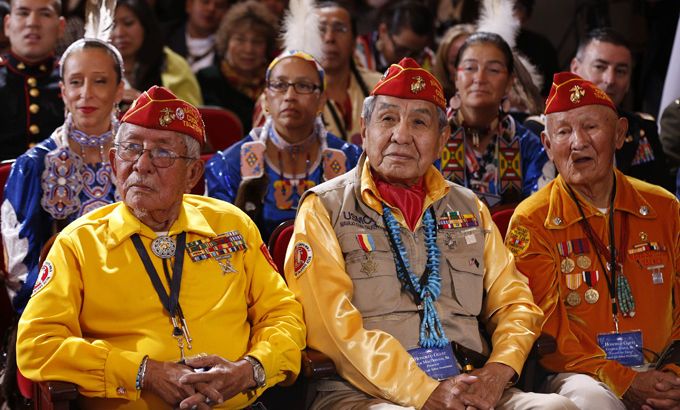
Improving the plight of Native Americans
Will the US address the systematic mistreatment and discrimination its Tribal Nations have endured for centuries?
On Wednesday, Barack Obama, the US president, hosted the fourth White House Tribal Nations Conference. It was attended by leaders of the 566 federally recognised Tribal Nations.
|
“Specifically discussed was the dire need, the issues that have engripped Indian country …. The countless generations of poverty, the trauma that exists within Indian country and beginning to take steps to right the wrongs that have been committed for countless generations to honour this country’s founding principle, to honour this country’s word and commitment to Indian country.“ – Brian Patterson, the president of the United South and Eastern Tribes |
And though Obama has been praised by some tribal leaders for engaging in the issues facing Native American communities far more deeply than previous presidents, their problems remain myriad and severe.
There were tens of millions of people and hundreds of Indian nations living across North America when Christopher Columbus first docked in the Caribbean. European settlers brought diseases that decimated native populations, but more importantly, used force to remove nation after nation from their traditional lands.
Some nations conveyed land to the US by treaty – usually following conflict or the threat of conflict – but much land was simply taken by force or fraud.
In the late 19th century, US policy focused on diluting or eliminating their sovereignty and collective rights as well as acculturating Indian people in the ways of the dominant society.
One of the most devastating programmes – with consequences which are still felt today – was the systematic removal of indigenous children.
They were taken from their families and placed in government or church-run boarding schools, where they were punished for speaking their languages or practising their native traditions.
A series of laws passed in the 1970s took initial steps toward rectifying some injustices.
- First Nations gained new autonomy
- Federal agencies were ordered to return indigenous remains and sacred objects
- Priority was placed on indigenous custody of indigenous children
- Federal agencies were ordered to provide support for the recovery of indigenous languages
But activists are challenging the US authority over American Indians, which has been called “a duty of protection”. Many natives are looking for real sovereignty over their land and natural resources.
|
“There are people who still have no electricity and live right next to generating stations. In my lands, we live with the border patrol that abuse us, beat us up and stripped all our rights to exist on our lands.” – Ofelia Rivas, a Native American rights activist |
Earlier this year, James Anaya, the UN special rapporteur on the rights of indigenous peoples, published a damning report that called on the US government to return land stolen from native American tribes. It also highlighted what he called systematic racial discrimination and the disproportionately high rates of poverty and violence in native American communities.
Anaya noted that Native Americans fare much worse based on social and economic indicators than any other group in the country. They suffer high poverty rates, low life expectancy, and higher than average rates of illness. Alcoholism and suicide are especially prevalent, particularly on reservations.
Rates of violent crime on Indian reservations are double the national average. Native American women are more than twice as likely to be victims of violence than the general population, although 80 per cent of rapes against them are committed by non-Indian men.
The rapporteur had multiple recommendations for the US government, such as:
- The government should address outstanding claims of treaty violations or non-consensual takings of traditional lands
- It should also restore or secure indigenous people’s access to sites of cultural or religious significance
- The government should also make efforts to heal historic grievances, like paying promised reparations to descendants of historic massacres by US forces
- Federal courts should abandon colonial-era doctrines of “trusteeship” in favour of alternative philosophies focused on modern human rights
Many argue that the failure to seriously address or even acknowledge problems with deep roots in American history makes progress difficult.
At the White House summit, Obama laid out what his administration had achieved for native Americans. So, are the challenges facing Native American tribes finally being addressed?
To discuss this, Inside Story Americas, with presenter Shihab Rattansi, is joined by guests: Brian Patterson, the president of the United South and Eastern Tribes, a national organisation that represents 25 tribes east of the Mississippi River; Patty Talahongva, a journalist who covers Native American issues and is a member of the Hopi nation; and Ofelia Rivas, a Native American rights activist and member of the Tohono O’odham nation.